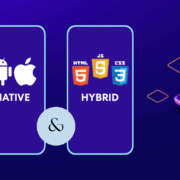Building Online Tutoring Platforms: Challenges and Solutions
Did you know that the global online tutoring market is expected to grow at a CAGR of 13.50% and reach the mark of $19.47 Billion by 2030?
You might not realize the rise in popularity of online tutoring platforms, but it has been quite significant in the past few years. In fact, Online tutoring platforms have completely transformed the way education is delivered.
For businesses in the education industry, online tutoring platforms have evolved as a reliable source of driving business growth with the power of modern technology. However, building an online tutoring platform is not as easy as it seems. It involves navigating through a landscape filled with multiple challenges and you must keep yourself equipped with effective solutions to achieve your goals.
This blog is all about online tutoring platforms, the key challenges in building them, and the most effective solutions to overcome these challenges.
What are Online Tutoring Platforms?
Online tutoring platforms are digital spaces where students and tutors connect to facilitate learning. These platforms provide interactive environments that support one-on-one or group tutoring sessions. These platforms are often equipped with different features such as video conferencing, whiteboards, live chats, and others.
Chegg and Tutor.com are some well-known examples of online tutoring platforms that have capitalized on the potential of online tutoring by making high-quality education accessible and flexible. Key features of a successful online tutoring platform are as follows:
- User-friendly interfaces
- Interactive tools
- Content libraries
- Payment gateways
- Progress tracking
Key Challenges in Building Online Tutoring Platforms
Having an online tutoring platform can prove to be a significant competitive advantage for businesses in the education industry. It not only enables you to offer better learning outcomes to students but also drives better growth and profit for your business. However, no success can be achieved without overcoming challenges.
Building an online tutoring platform is a path with several hurdles to jump over. Here are some major challenges that you might face:
Technological Infrastructure
Developing a robust online tutoring platform requires advanced technology that can handle high volume of traffic, support seamless video streaming, and ensure strong data security. Having the required technological infrastructure, choosing the right tech stack for your platform, and ensuring scalability are significant challenges. Moreover, integrating emerging technologies like AI further increases the complexity.
User Experience (UX)
Creating an engaging and intuitive user experience (UX) for your platform is crucial. Poor design, slow loading times, and complicated navigation are some major challenges in UX design that you might face. Poor user experience can lead to reduced engagement and high dropout rates. Additionally, ensuring accessibility for students with special needs can add another layer of complexity to UX designing.
Tutor Quality Control
Tutors are the most valuable contributors to the success of any online tutoring platform. However, finding and maintaining a pool of qualified, reliable tutors across diverse subjects can be a challenging task. The platform must also address the challenge of standardizing diverse teaching styles and ensuring consistency in tutor performance while finding a balance in delivering quality with quantity.
Security and Privacy
Today’s digital world is full of hackers, cyber attacks, and privacy threats. Thus, handling sensitive data such as personal information and payment details, requires strong security measures. A data breach or cyber attack can severely damage a platform’s reputation and user trust. Furthermore, adhering to various global data protection laws can make compliance an ongoing challenge.
Internet Accessbility
As the name suggests, online tutoring platforms heavily rely on the availability of a stable internet connection. However, not all users have access to high-speed internet, particularly in rural and underdeveloped areas. This gives rise to several challenges on how a platform can be made accessible even without the internet. Not addressing these challenges can limit a platform’s reach and effectiveness.
Solutions for Challenges in Building Online Tutoring Platforms
Knowing about the challenges you might face while building an online tutoring platform is important, but what’s more important is that you must know the right solutions to address these challenges efficiently. You must keep yourself ready with solutions that can be implemented quickly and effectively to minimize the negative impact.
The solutions to challenges we have mentioned in building online tutoring platforms are as follows:
Investing in Advanced Technology
To address the challenges of technological infrastructure, you must opt for a scalable cloud-based architecture to accommodate growing user bases. You must use reliable frameworks and programming languages to build a stable backend. At last, implement the use of Content Delivery Networks (CDNs) to ensure smooth video streaming and faster load times.
Enhancing User Experience
To enhance the user experience (UX) of your online tutoring platform, you can first conduct extensive user research to understand the needs and preferences of your target audience. Next, you can employ responsive design elements to ensure compatibility across devices. Also, you must regularly update your platform’s interface based on user feedback.
Building Tutor Network
Having a strong tutor network is a highly effective solution for addressing tutor-related challenges. Partnering with educational institutions and experienced educators is a great way to create accurate and engaging content. You can also implement a rigorous vetting process including certifications, background checks, and demo sessions to hire the best tutors only.
Strengthening Security Measures
To address the challenges related to data security, you can implement modern security features in your online tutoring platform. Use end-to-end encryption for communication and data transfers. Integrate secure payment gateways that comply with global data protection regulations. At last, conduct regular security audits to identify and fix vulnerabilities.
Addressing Internet Accessibility Issues
Internet accessibility challenges can be addressed by optimizing platforms for low-bandwidth usage by offering downloadable resources and adaptive streaming options. You can create offline features, such as recorded sessions, to cater to users in remote areas. Also, you can partner with telecom providers to bundle affordable internet plans with your platform’s subscription.
The Future of Online Tutoring Platforms
The future of online tutoring platforms looks promising, driven by technological advancements and changing educational demands. Artificial Intelligence (AI) and Maschine Learning (ML) will play a pivotal role in personalizing the learning experience while AR and VR will make learning more immersive on these platforms.
All in all, online tutoring platforms are on the right path and businesses in the education industry can leverage them to drive growth and success. Unpredictable challenges in building online tutoring platforms can arise in the future, however, they can be effectively addressed with appropriate solutions.
Final Thoughts
Building an online tutoring platform is a multifaceted endeavor that requires a deep understanding of technology, education, and user behavior. While the challenges are considerable, innovative solutions and a commitment to excellence can pave the way to success.
As the education industry continues to evolve, these platforms will play an increasingly important role in shaping the future of learning. By addressing current challenges and embracing technologies, online tutoring platforms can provide meaningful, impactful, and accessible education to learners worldwide.




